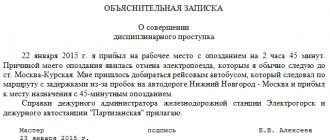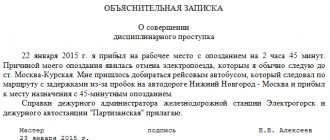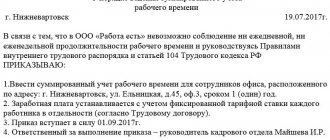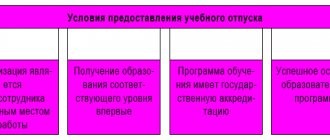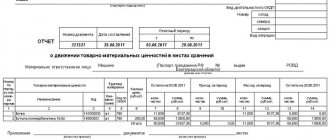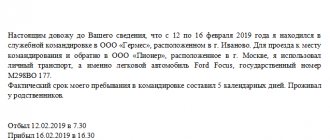In cases where a labor duty is violated by an employee, disciplinary sanctions are applied to him. They are defined by Article 192 of the Labor Code of Russia (hereinafter referred to as the Labor Code of the Russian Federation). Determining the penalties for negligent workers rests with the employer.
Dear readers! The article talks about typical ways to resolve legal issues, but each case is individual. If you want to find out how to solve your particular problem , contact a consultant:
+7 (499) 110-56-12 (Moscow)
+7 (812) 317-50-97 (Saint Petersburg)
8 (800) 222-69-48 (Regions)
APPLICATIONS AND CALLS ARE ACCEPTED 24/7 and 7 days a week.
It's fast and FREE !
You need to know how documents are drawn up correctly when involving such types of punishment as disciplinary action.
What it is
Disciplinary action is a specific type of punishment applied to an employee if he or she violates the terms of an employment or collective agreement. By violating an employment contract, a subordinate abuses his powers, fails to fulfill his duties, misses deadlines, and more.
Violations of the collective agreement are cases when employees bypass the rules, work schedule, workplace discipline, etc., relating to a comfortable life in the team.
Cases when Article 192 of the Labor Code of the Russian Federation comes into force - the procedure for applying disciplinary sanctions:
- neglect of duties;
- poor quality work;
- missed deadlines;
- violation of labor discipline (being late for work, leaving home early, etc.)
Familiarization with the rules of how to behave at work, what and how to obey, is provided for study when applying for a job. In addition, a person may also be given the opportunity to become familiar with the rules during a transfer from one position to another, or one department to another.
This also includes cases of significant changes to the collective agreement or in connection with updates, creation of other key documents for the enterprise that affect the staff.
Appealing a disciplinary sanction
If the employer violates the procedure and deadlines for applying a penalty, the employee has the right to appeal it. The employer does not have the right to impose any type of punishment without requiring an explanatory note. You cannot punish an employee for being absent from work if he has sick leave. It is also prohibited to punish repeatedly for the same offense. All of the above gives the right to appeal against the penalty. In addition, some employers use wage deductions that are illegal.
An appeal is made within 3 months after disciplinary sanctions are issued; in case of dismissal, this period is reduced to one month. To do this, you should contact the labor inspectorate, the commission for official or labor disputes, or the court.
How can I appeal a disciplinary sanction to the Ministry of Internal Affairs?
The appeal of these sanctions by employees of the Ministry of Internal Affairs is no different from the generally accepted ones. To do this, they need to contact their immediate supervisor, the court or the commission for official disputes. Employees have a three-month period to appeal after reading the order. The dispute is considered within a month, and its appeal is possible only within 10 days after the decision is made.
Legislation
The structure of the article of the Labor Code of the Russian Federation presupposes a definition of what a disciplinary sanction is, as well as the types and amount of penalties for violating labor regulations or the terms of an employment agreement.
But in addition to Article 192 of the Labor Code of the Russian Federation, disciplinary sanctions expressed in other punishment options can be put into practice on the basis of federal or regional laws.
For example, this may apply to such areas of activity as various regular military formations - penalties are applied according to the charter of the military institution.
If an employer allows dismissals in cases that do not relate to disciplinary (or other) violations prescribed by law, then this is already considered unlawful actions.
These actions of the employer will be considered under Article 286 of the Criminal Code of the Russian Federation as abuse of official authority.
On the issue of the statute of limitations, there is a rule, also determined on the basis of Art. 192 Labor Code of the Russian Federation. It states that all cases of violation by a worker of his own duties, the terms of an employment agreement, or a collective agreement must be considered as soon as possible.
The duration of disciplinary action is no longer than 1 month. The countdown starts from the moment the employee’s unlawful acts are discovered.
When determining the statute of limitations, there are some peculiarities:
- The period of illness is not taken into account.
- Staying on legal leave is ignored.
- Holidays and weekends are not taken into account.
But there are some legal differences on this issue. They are solvable in court. Therefore, to effectively determine the maximum limitation period, it is customary to take 6 months.
It is this period that is often given by the courts to settle all the subtleties and nuances of the case. There are other deadlines for special cases.
It turns out that the longest statute of limitations should not exceed:
- 1 month – to implement the collection itself into practice;
- six months – under circumstances that are difficult to investigate;
- 2 years – for violators, financially responsible officials.
The law also distributes penalties according to the offenses committed. This means that one disciplinary action is applied only for one violation.
But if the violations caused consequences of a different nature, then it is permissible to apply different types of punishment. But the same punishment can be applied repeatedly if violations continue.
The concept of disciplinary offense
Article 192 of the Labor Code of the Russian Federation reveals such a legal concept as a disciplinary offense - this is “the failure or improper performance by an employee, through his fault, of the labor duties assigned to him.” The wording sounds quite simple, but from a legal point of view it contains several independent elements, each of which should be discussed in more detail:
- Failure to perform should be understood as ignoring any duties, while improper fulfillment involves less serious violations (refusal of a medical examination, training and exams, if these are a prerequisite for access to work, absenteeism).
- Guilt should be understood as a combination of two elements: the employee’s awareness of the illegality of his actions, and his desire to break any rules.
- Labor responsibilities should not be understood only as the amount of work that is provided for in agreement with the organization. In accordance with paragraph 35 of the resolution of the Plenum of the Supreme Court of the Russian Federation No. 2 dated March 17, 2004, the employee’s duties may be contained, in addition to the employment contract, in the internal work regulations, job descriptions, other orders of the employer, as well as laws.
Kinds
In parts 1-2 tbsp. 192, the list of applicable penalties includes the following types of penalties:
| Responsibility under Art. 129 Labor Code of the Russian Federation | Explanation |
| Comment | This is done in writing. |
| Rebuke | It is also carried out in writing and entered into:
|
| Dismissal | Termination of an employment contract based on violations committed by the employee. |
A reprimand can be divided into types:
- ordinary (no monetary penalties);
- strict (using deduction of administrative fines from salaries).
Examples of additional liability measures determined by federal laws and other legal acts:
- disqualification from holding office for 1 month;
- money penalty;
- additional workload (especially to correct the consequences);
- other.
They are usually suspended from work for a month in cases where it is necessary to examine the case in detail. But even when the suspect’s guilt is proven, he cannot be deprived of earnings for the overdue period.
The employer is still obliged to pay the minimum wage, even if the offender has not worked for a month. This is provided for the reason that the initiative for removal from work did not come from the worker, but from his superiors.
System of employee punishments provided for by law
In order to prevent arbitrariness on the part of the employer and violation of the rights of employees, the legislative bodies clearly defined a system of punishments. The following disciplinary measures are provided under the Labor Code:
- comment;
- rebuke;
- dismissal if there are grounds for it.
Allowable penalties
As a rule, it is these types of disciplinary sanctions under the Labor Code of the Russian Federation that are used by employers. The law directly establishes restrictions on the application of other types of punishment to subordinates, but formally this list is expanded for specific categories of workers (depending on the field of production in which they are employed). For example, the following sanctions can additionally be applied to railway transport employees:
- deprivation of a special certificate;
- dismissal from office;
- dismissal for additional reasons.
Separately, it is worth saying that the manager’s freedom of action is limited by the requirement to take into account the following factors:
- the severity of the offense committed;
- the circumstances under which it was committed.
In addition, the boss has the right to take into account other circumstances, for example, the characteristics of the employee.
Advice! If the punished person considers that these rules were not followed, the decision can be challenged in the prescribed manner.
The legislative framework
The main regulatory legal act in this area is, of course, the Labor Code of the Russian Federation. In Russia, this branch of legislation stands out favorably, since almost any everyday issues that arise in the process of carrying out work duties can be resolved by opening just one code. All the nuances of encouraging subordinates and imposing on them the prescribed types of penalties under the labor code are spelled out in Chapter 30 of Section 8.
At the same time, it is still impossible to stipulate the features relating to individual areas of labor activity in one legislative act. For this reason, there are a lot of by-laws of the President of the Russian Federation, the Government of the Russian Federation and relevant ministries. With regard to disciplinary liability, the following current versions of the sources of law can be noted:
- Articles 57, 59.1 of the Federal Law (hereinafter referred to as the Federal Law) “On the State Civil Service of the Russian Federation”.
- Article 49 of the Federal Law “On service in the federal fire service...”.
- Articles 50, 50.1 of the Federal Law “On service in the internal affairs bodies of the Russian Federation...”.
- Chapter 6 of the decree of the President of the Russian Federation “On approval of the Disciplinary Charter of the Customs Service of the Russian Federation.”
- Chapter 4 of the Decree of the Government of the Russian Federation “On approval of the Charter on the discipline of crews of Navy support vessels.”
- Chapter 3 of the Decree of the Government of the Russian Federation “On approval of the Regulations on the discipline of railway transport workers of the Russian Federation” and so on.
On the conditions for bringing disciplinary action
In order to bring a subordinate to justice under Article 191 of the Labor Code of the Russian Federation, the employer must comply with a number of mandatory conditions, some of which have already been covered earlier:
- Establish and record the fact of committing a disciplinary offense.
- Clearly determine what norms and rules were violated in this case.
- Collect all possible information about the event that occurred (these are the circumstances that the manager must take into account).
- Assess whether there is a connection between the actions of one worker or their group and the resulting result, and also establish their guilt in committing an offense.
Application procedure
The procedure for imposing disciplinary liability on an employee is enshrined in labor legislation, namely Art. 193 Labor Code of the Russian Federation. To begin with, here are the main steps:
- Obtaining personal explanations from the alleged violator in writing. In the event that this is not provided within a two-day period, the employer has the right to draw up an appropriate act and continue the procedure without waiting any longer for any reasons to be indicated by the guilty employee.
- Issuance by the employer of a formal order imposing disciplinary action, which states the following:
- for what violation the sanction is applied;
- which employee is subject to the sanction;
- what type of punishment was chosen by the boss.
- Notifying the guilty person about the issuance of the relevant order by presenting and receiving a signature within 3 working days. If here, too, an employee of the organization refuses to sign, the manager can draw up an act similar to the one mentioned above.
- An optional step is to appeal the employer’s decision, but we can return to this issue a little later.
In addition to those mentioned, the article in question contains several provisions on restrictions associated with the application of disciplinary liability:
- One violation may result in only one prosecution.
- No more than one month should pass between the discovery by the immediate superior of a violation committed by the guilty person and the imposition of a sanction. Only the time the employee is ill or on vacation is not taken into account.
- No more than six months must pass between the commission of the violation and the issuance of the order. This period is a general rule. Longer periods of time are provided for cases where the event was discovered through audits, inspections and audits (two years) and if we are talking about violations in the field of corruption (three years).
Removal of disciplinary action
Two paragraphs of the following article of the Labor Code - 194 are devoted to this issue. It stipulates two cases of lifting a previously imposed penalty. Firstly, this is possible after the expiration of the statutory period of one year, after which the employee is considered not to be held accountable. The condition that the employee must comply with is not to find himself in a similar situation again during the specified period.
It is important to know! Previously, only the employer can remove the status of being held accountable from an employee. Almost everyone can raise this issue: an employee, his immediate supervisor, a body representing the interests of the work collective, and, of course, the head of the organization himself.
https://youtu.be/waSGO6Q2RSY
Additional measures and conditions for their appointment
In addition to the types of punishment discussed, the employee may be required to compensate for the damage caused by the violation. This type of penalty is called “material liability” and is applied in accordance with the provisions of Chapter 39 of the Labor Code of the Russian Federation.
At the same time, there are also restrictions regarding the establishment of mandatory payments in favor of the employer. For example, only so-called direct actual damage is subject to compensation. This means that the guilty employee will be obliged to pay exactly enough money to cover the losses caused in the form of damage or deterioration of the employer’s things. It will no longer be possible to recover the profit lost due to the organization’s downtime.
In addition, if it is established that the employer himself did not fulfill some of the duties assigned to him, which resulted in damage to property, then it will no longer be possible to blame the employees for the losses.
Features of imposing fines
As the most important feature of imposing fines for causing damage to the employer’s property, it should be noted that the law sets a limit on the amount that can be withheld from a person. This is the average monthly salary of an employee, determined based on data for the last year. Full compensation for damage caused is only possible in the following cases:
- When a shortage of those valuables that were entrusted to the person in connection with his position is revealed.
- When the harm was caused intentionally.
- When the damage was caused by a state of intoxication (alcohol, drugs, toxic).
- When by his actions the employee violated the norms of the Code of Administrative Offenses or the Criminal Code of the Russian Federation.
- When damage is caused by disclosing secrets protected by law.
- When the damage is caused outside of working hours.
Reasons
The following offenses serve as grounds for imposing disciplinary sanctions:
- one-time delays;
- failure to comply with labor standards established in production;
- absence from briefings;
- ignoring mandatory inspections and workplace inspections;
- failure to meet deadlines;
- refusal to carry out instructions or orders from the immediate supervisor that affect the employee’s immediate job responsibilities;
- failure to provide documents necessary for official employment.
But there are also gross violations (described in Article 81 of the Labor Code of the Russian Federation, points 5-6):
- regular misconduct;
- lack of valid reasons;
- absenteeism (more than 4 hours of working time);
- appearing drunk;
- drinking alcohol (using other intoxicating substances) in the workplace;
- disclosure of commercial (other) secrets;
- intentional theft or damage to company property and other cases.
It is also necessary to say about the circumstances that may become mitigating for the employee who has been at fault.
When an employer selects the type and amount of punishment, he takes into account:
- the quality of performance of duties by the employee in the recent past (one month before the violation was discovered);
- presence of force majeure situations (force majeure);
- general characteristics of the subordinate;
- the severity of the consequences that arose after the violations were committed.
Disciplinary measures under the Labor Code
In addition to dismissal, the Labor Code specifies such penalties as reprimand and reprimand. The first is a verbal warning, or a corresponding written order without an entry in the work book. The second consists of official registration for more serious types of misconduct and can be entered in the work book if it is regular.
Regarding dismissal, it is important to add that it carries more serious consequences, since not only will you have to search for a new job, but also difficulties in finding a job due to a negative entry in the work book.
Material measures include fines that are illegal, deprivation of bonuses if provided for in the contract, or financial liability. Its use is likely to cause damage to the property of an enterprise.
Disciplinary sanctions against military personnel
Military personnel, along with employees, can also commit disciplinary offenses and, as a result, penalties are applied to them. This right may be exercised in accordance with Article 75 of this Charter. These include:
- a severe reprimand or entered into a personal file;
- outfits out of turn (up to 5);
- ban on layoffs;
- reduction of rank;
- early dismissal from service;
- determination for the position below;
- disciplinary arrest or correctional labor.
In addition, material punishments are also applied to military personnel, such as deprivation of one-time payments or quarterly bonuses, as well as entering information into a personal card.
Disciplinary sanctions in the state civil service
For civil servants, the procedure and types of disciplinary sanctions are almost identical to the generally accepted ones, but, nevertheless, they have a number of differences. An additional penalty is a warning about incomplete performance. This is the so-called threat of dismissal. In such a situation, as a rule, the employee is demoted and offered other vacancies. If there are no such people, then he will be fired. The civil service also provides for an internal audit, on the basis of which the employee’s guilt is determined.
Rules for drawing up a document
We propose to consider several examples of documentation that appear when issuing a disciplinary sanction against employees who have committed serious or moderate violations.
Sample explanatory note:
A sample of an act drawn up in cases where an employee does not agree with the charges:
An order form for disciplinary action is available.
How to apply
Procedure for filing a disciplinary sanction:
- Calling the employee to the director or head of a department or division.
- Obtaining explanations from the offending employee, finding out the reasons for his actions, etc.
- The employee must write an explanatory note.
- If you refuse to submit an explanatory document, the employer draws up an act of insubordination.
- An order to impose punishment is drawn up. Deadline – no later than 3 days in working hours.
- The employee must sign the order.
- In case of refusal to sign the order, an act of disagreement is also drawn up.
If a subordinate categorically refuses to write an explanatory note, then monetary penalties in the form of a fine may be applied to him.
Here another order comes into force:
- The employee is given another 2-3 days to think about it.
- Then an act of refusal to explain what happened or the violation was drawn up.
- He must sign the document.
- If the act is not signed by the employee, then the penalty is imposed on him anyway.
According to Article 192 of the Labor Code of the Russian Federation, in cases of an employee’s refusal to explain the reasons for the misconduct, the employee’s opinion will no longer be taken into account. Therefore, the employer has every right to determine the extent of the financial penalty or other type of punishment.
Every employee or employee who violates discipline at work can be punished by the employer. He may be reprimanded, fined, or suspended from office for a short time. But the violator also has the right to appeal the employer’s decision.
To do this, all such employees are given time to appeal - 3 months. But first they turn to the GIT (State Labor Inspectorate), and if nothing works out, then only to the judicial authorities.
Application procedure
When bringing a citizen to disciplinary punishment, it is necessary to follow a certain procedure. It consists of several stages:
- Drawing up a report and act on the fact of the offense.
- Inviting the employee to provide management with a written explanation of the reasons for the violation. If the employee refuses to comply with this request or does not submit the document within two days, this is recorded in a report drawn up in front of witnesses.
- The employer, after assessing all the circumstances of the incident and the evidence presented by the employee to justify his action, decides the issue of his guilt. If a citizen is found guilty, the employer chooses a penalty for him, which must correspond to the severity of the guilt. It should be borne in mind that lack of evidence does not give the enterprise administration the right to apply a more severe punishment.
- Issuing a sentencing order. The document must contain all information about the violator, a description of the offense, a link to regulations, grounds and type of penalty. The employee must be familiarized with the order and signed within three working days. If he refuses, then a special act on this fact is drawn up, certified by the signatures of witnesses to the refusal.
When choosing a penalty, the employer must remember that it is unacceptable to apply two punishments to an employee for one violation. But the legislation of the Russian Federation allows the use of deprivation of bonus payments as an additional measure of influence.
https://youtu.be/qr5MMWyUmKo

